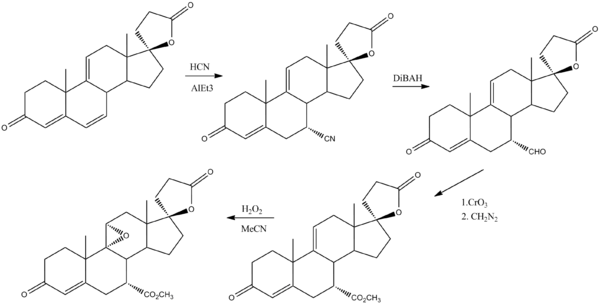Eplerenone
 | |
|---|---|
| Systematic (IUPAC) name | |
| pregn-4-ene-7,21-dicarboxylic acid, 9,11-epoxy-17-hydroxy-3-oxo, γ-lactone, methyl ester (7α, 11α, 17α) | |
| Clinical data | |
| Trade names | Inspra |
| AHFS/Drugs.com | monograph |
| MedlinePlus | a603004 |
| Pregnancy cat. | B3 (Aust) |
| Legal status | Schedule 4 (Aust), Rx only (US) |
| Routes | oral |
| Pharmacokinetic data | |
| Bioavailability | 69% |
| Metabolism | hepatic (CYP3A4) |
| Half-life | 6-8 hours |
| Excretion | 67% renal 32% biliary |
| Identifiers | |
| CAS number | 107724-20-9 |
| ATC code | C03DA04 |
| PubChem | CID 5282131 |
| IUPHAR ligand | 2876 |
| DrugBank | DB00700 |
| ChemSpider | 10203511 |
| UNII | 6995V82D0B |
| KEGG | D01115 |
| ChEBI | CHEBI:31547 |
| ChEMBL | CHEMBL1095097 |
| Chemical data | |
| Formula | C24H30O6 |
| Mol. mass | 414.49 |
| SMILES
| |
| |
| | |
Eplerenone (INN) /ɛpˈlɛrənoʊn/ is an aldosterone antagonist used as an adjunct in the management of chronic heart failure. It is similar to the diuretic spironolactone, though it is much more selective for the mineralocorticoid receptor in comparison (i.e., does not possess any antiandrogen, progestogen, or estrogenic effects), and is specifically marketed for reducing cardiovascular risk in patients following myocardial infarction. It is marketed by Pfizer under the trade name Inspra. Eplerenone is a potassium-sparing diuretic, meaning that it helps the body get rid of water but still keep potassium.
Medical use
Eplerenone is specifically indicated for the reduction of risk of cardiovascular death in people with heart failure and left ventricular dysfunction within 3–14 days of an acute myocardial infarction, in combination with standard therapies and as treatment against hypertension. It appears equivalent to spironolactone but is much more expensive.[1]
Adverse effects
Common adverse drug reactions (ADRs) associated with the use of eplerenone include: hyperkalaemia, hypotension, dizziness, altered renal function, and increased creatinine concentration.[2] Eplerenone may have a lower incidence of sexual side effects such as feminization, gynecomastia, impotence, low sex drive and reduction of size of male genitalia.[3] Due to the high risk of elevated potassium levels in individuals taking eplerenone, the United States FDA suggests routine checks on the individual's potassium level to screen for hyperkalemia.
Contraindications
Eplerenone is contraindicated in patients with hyperkalaemia, severe renal impairment (creatinine Cl less than 30 ml/min), or severe hepatic impairment (Child-Pugh score C). The manufacturer of eplerenone also contraindicates ( relative C.I. ) concomitant treatment with ketoconazole, itraconazole or other potassium-sparing diuretics (though the manufacturer still considers taking these drugs to be absolute C.I.) Potential benefits should be weighted against possible risks.
Drug interactions
Eplerenone is primarily metabolised by the cytochrome P450 enzyme CYP3A4. Thus the potential exists for adverse drug interactions with other drugs that induce or inhibit CYP3A4. Specifically, the concomitant use of the CYP3A4 potent inhibitors ketoconazole and itraconazole is contraindicated. Other CYP3A4 inhibitors including erythromycin, saquinavir, and verapamil should be used with caution. Other drugs that increase potassium concentrations may increase the risk of hyperkalaemia associated with eplerenone therapy, including salt substitutes,[4] potassium supplements and other potassium-sparing diuretics.
Lab Synthesis

Steroidal, Aldosterone Antagonists: Increased selectivity of 9α,11-epoxy derivatives. doi:10.1002/hlca.19970800220.
See also
- Spironolactone
- Aldosterone antagonist
- Canrenone
References
- ↑ Chatterjee, S; Moeller, C; Shah, N; Bolorunduro, O; Lichstein, E; Moskovits, N; Mukherjee, D (August 2012). "Eplerenone is not superior to older and less expensive aldosterone antagonists.". The American Journal of Medicine 125 (8): 817–25. doi:10.1016/j.amjmed.2011.12.018. PMID 22840667.
- ↑ Rossi S, editor.Australian Medicines Handbook 2006. Adelaide: Australian Medicines Handbook; 2006
- ↑ Craft, Jennifer (April 2004). "Eplerenone". Proc (Bayl Univ Med Cent); Eplerenone (Inspra), a new aldosterone antagonist for the treatment of systemic hypertension and heart failure (Pub MedCentral) 17 (2): 217–20. PMC 1200656. PMID 16200104.
- ↑ LoSalt Advisory Statement (PDF)
| ||||||||||||||||||||||||||||||||||||||||||